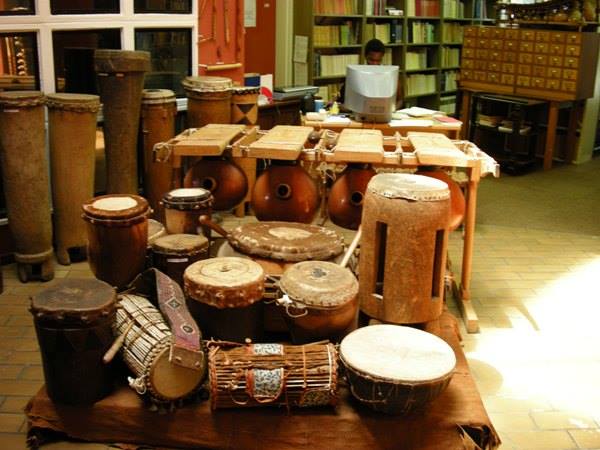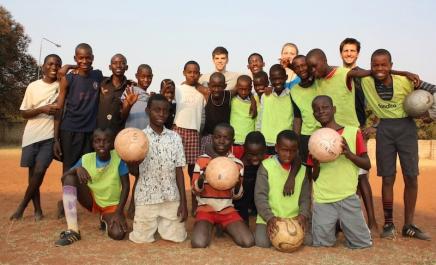Cultural and Traditions
Social Customs
Music and Dance
Cuisine
Sport
Customs
Traditional ceremonies
Nc'wala
When it celebrates:
Annual 24 February
Where it takes place:
In the eastern edge of Zambia, which is close to Chipata
The purpose of it:
Blessing the glorious deeds of the tribe and the first fruit of the season. [1]
How they celebrate:
The ceremony begins with tasting of the first fruit by the chief of the tribe, who have to dress in leopard skins. A bull is then scarified for the ceremony and the event is continued with dancing and mocking fight among the impis (warriors). [2]
Kuomboka

When it celebrates:
During the month of February or March
Where it takes place:
In the Western Province of Zambia.
The purpose of it:
The name of the festival refers to "get out of the water and onto dry land" [3], the significance of the ceremony is to celebrate the successful move and settlement to higher ground due to the flood plain is covered by the rise of the upper Zambezi Valley in every year towards the last of the rainy seasons. [4]
How they celebrate:
The celebration lasted for three days, which begins with a drumming ceremony around the royal capital. The following day, a canoeing regatta race will take place at the Nayuma Port. Finally, it ends with the sounds of the Mwenduko drum echo, which summoning participants to their posts. [5]
Likumbi Lya Mize
When it celebrates:
On the last weekend of August every year
Where it takes place:
In the North Western Province of Zambia.
The purpose of it:
Historically, the festival marked the re-entrance of boys who had been in seclusion for 'Mukanda' (male circumcision) back into society. [6] And now it evolves into a Makishi masquerade, a tradition in which moral and practical life lessons are offered to boys between the ages of 8 and 12. [7]
How they celebrate:
The four days ceremony starts on the last Wednesday of August and held on the both sides of the Zambezi River with a market and the performances of recreating mythological events by masked Makishi dancers and finally conclude with a royal Makishi parade for the chief. [8]
Music and Dance
The cultural of Zambian music and dance had faced various challenges during the colonial period. Most traditional performance were discourage as backyard due to the threatening to colonial authority. However, the cultural of entertainment has been revived after independence. [9]

Muganda Dance
Culturally gende-specific dance for young men, following the harvest but before the rainy season and the planting of new crops
The Kankanga Dance
The dance is a central part of the coming-out ceremony in which the girl is introduced as a woman and a wife.
Cuisine
The cultural of food
![Nshima, a stiff dough or dumpling, made of cornmeal (maize). The food is traditionally eaten by using hands. [10]](https://b0927eac2b.cbaul-cdnwnd.com/304d1a672291ec514e84ad535651017f/200000057-08d8e09cdd/%E8%9E%A2%E5%B9%95%E6%88%AA%E5%9C%96%202018-12-12%20%E4%B8%8B%E5%8D%888.57.22.png?ph=b0927eac2b)

Sport
The sport cultural of Zambia can be traced back to the period of European colonial, in when Western sports, including rugby, boxing, tennis, and basketball etc. are imported into Zambia. Among these sports, football became the most popular one and even is considered as national sport, which can be proofed in below: [11]

Reference
[1]、[2] Kapambwe, M. (2018, March 19). 9 Traditional Festivals in Zambia You Have to Attend. Culture Trip. Retrieved from https://theculturetrip.com/africa/zambia/articles/9-traditional-festivals-in-zambia-you-have-to-attend/
[3] Festivali in Zambia. (n.d.). Zambia Tourism. Retrieved from https://www.zambiatourism.com/about-zambia/people/festivals/#
[4] Taylor, S. D. (2006). Social customs and lifestyle, Culture and customs of Zambia. (pp.111-112) London: Greenwood Publishing Group.
[5] Cultural Festivals in Zambia. (n.d.). Always Africa. Retrieved from https://www.alwaysafrica.co.za/blog/cultural-festivals-in-zambia.html
[6] Kapambwe, M. (2018, March 19). 9 Traditional Festivals in Zambia You Have to Attend. Culture Trip. Retrieved from https://theculturetrip.com/africa/zambia/articles/9-traditional-festivals-in-zambia-you-have-to-attend/
[7] 、[8] Festivali in Zambia. (n.d.). Zambia Tourism. Retrieved from https://www.zambiatourism.com/about-zambia/people/festivals/#
[9] Taylor, S. D. (2006). Music and Dance, Culture and customs of Zambia. (pp.125-133) London: Greenwood Publishing Group.
[10] Jovago, J. W. (2016, June 13). The unrivaled Zambian culture. Ayiba Magazine. Retrieved from https://ayibamagazine.com/unrivaled-zambian-culture/
[11] Kapambwe, M. (2018, May 16). 9 Sports You Didn't Know Are Popular in Zambia. Culture Trip. Retrieved from https://theculturetrip.com/africa/zambia/articles/9-sports-you-didnt-know-are-popular-in-zambia/
[12] Wood, R. (2014). Sport in Zambia. Topend Sports Website. Retrieved from https://www.topendsports.com/world/countries/zambia.htm
